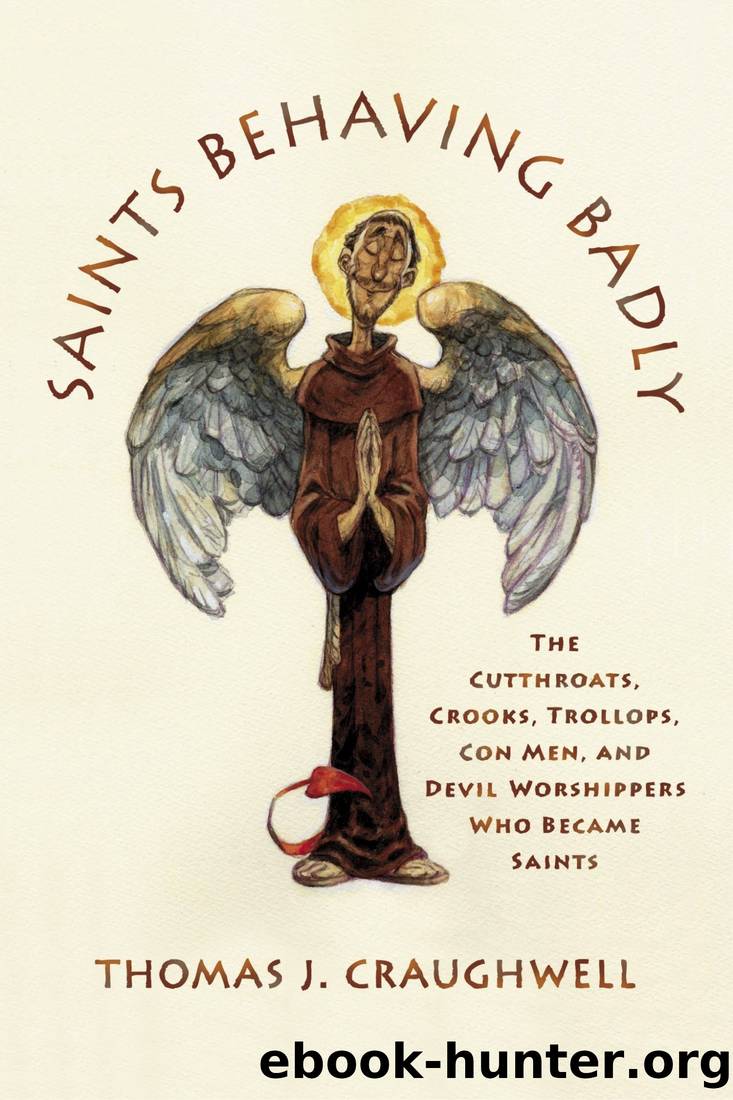Saints Behaving Badly: The Cutthroats, Crooks, Trollops, Con Men, and Devil-Worshippers Who Became Saints by Thomas J. Craughwell

Author:Thomas J. Craughwell [Craughwell, Thomas J.]
Language: eng
Format: epub
Tags: Autobiography, Biography, Catholic, Christianity, Humour, Non-Fiction, Religion, Religious, Topic
ISBN: 9780385517201
Google: DvyQNfdUEL0C
Amazon: 0385517203
Publisher: Image
Published: 2006-09-18T23:00:00+00:00
St. Thomas Becket, Hedonist
[c. 1120–1170] FEAST DAY: December 29
His name was Thomas Becket. Not Thomas à Becket—which he never used and no one ever called him until sometime after the Reformation, when the odd name began to crop up in books, perhaps because it had a more medieval ring to it, or perhaps because people were confusing their Thomases: there was Thomas Aquinas, the great theologian, and Thomas à Kempis, the author of Imitation of Christ. But the Thomas we will be discussing was just plain Becket.
Nor was he a Saxon. The portrayal of Thomas as a lowborn Saxon upstart bossing around Norman nobles has no basis in history. It is a plot device from the 1964 movie Becket, starring Richard Burton and Peter O’Toole.
The real Thomas Becket was born in London on the afternoon of December 21, probably in the year 1120. By the liturgical calendar of the time it was the feast of St. Thomas the Apostle, so the infant’s parents, Matilda and Gilbert, gave their son the name “Thomas” at his baptism.
The family came from Norman merchant stock. Gilbert emigrated from France to England as a young man. In fact, he and Theobald, archbishop of Canterbury, both hailed from the same part of Normandy, near the town of Thierville. We know that once, at some function or other, the merchant and the archbishop enjoyed a pleasant conversation together, swapping news about neighbors and relatives back home in the Old Country.
We know almost nothing about Matilda, except that she was keen on education for her boy. From age ten until he was twenty-one, Thomas studied first at the Augustinian priory at Merton, fifteen miles outside London, then at a London school, and finally at the university in Paris. Thomas’s clerk, John of Salisbury, recalled that his master had an excellent memory and a subtle mind that could find a solution to almost any problem. And Thomas was very handsome—all the chroniclers of his time mention his good looks. No one says, however, that Thomas Becket was affectionate, or friendly, or pleasant to be around. Archbishop Theobald, who purposely put Thomas on the path to a great career by making him part of his household, and King Henry II, who unintentionally set Thomas on the path to sainthood by compelling him to accept the office of archbishop of Canterbury, both loved the man. Thomas’s feelings for the elderly archbishop and the young king were a mixed bag of respect, gratitude, and resentment.
Thomas, like all clerks in this period, was considered a member of the lower ranks of the clergy. The word “clerk” is derived from “cleric.” They accepted the tonsure, in which the hair on the crown of the head was cropped in the style of a priest, and they took minor orders, the first formal steps toward ordination to the priesthood. These formalities did not compel any student to take final vows as a priest. They did not oblige him to remain celibate, nor bar him from any secular occupation later in life.
Download
This site does not store any files on its server. We only index and link to content provided by other sites. Please contact the content providers to delete copyright contents if any and email us, we'll remove relevant links or contents immediately.
Resisting Happiness by Matthew Kelly(2881)
The Social Psychology of Inequality by Unknown(2302)
Designing Your Life by Bill Burnett(2257)
Day by Elie Wiesel(2237)
The Giving Tree by Shel Silverstein(1830)
Angels of God: The Bible, the Church and the Heavenly Hosts by Mike Aquilina(1624)
Human Design by Chetan Parkyn(1568)
Augustine: Conversions to Confessions by Robin Lane Fox(1469)
The Supreme Gift by Paulo Coelho(1442)
Hostage to the Devil by Malachi Martin(1391)
7 Secrets of Divine Mercy by Vinny Flynn(1386)
Jesus of Nazareth by Joseph Ratzinger(1373)
The Vatican Pimpernel by Brian Fleming(1337)
Dark Mysteries of the Vatican by H. Paul Jeffers(1337)
Saints & Angels by Doreen Virtue(1310)
St. Thomas Aquinas by G. K. Chesterton(1301)
My Daily Catholic Bible, NABRE by Thigpen Edited by Dr. Paul(1206)
Called to Life by Jacques Philippe(1200)
The Ratline by Philippe Sands(1161)
